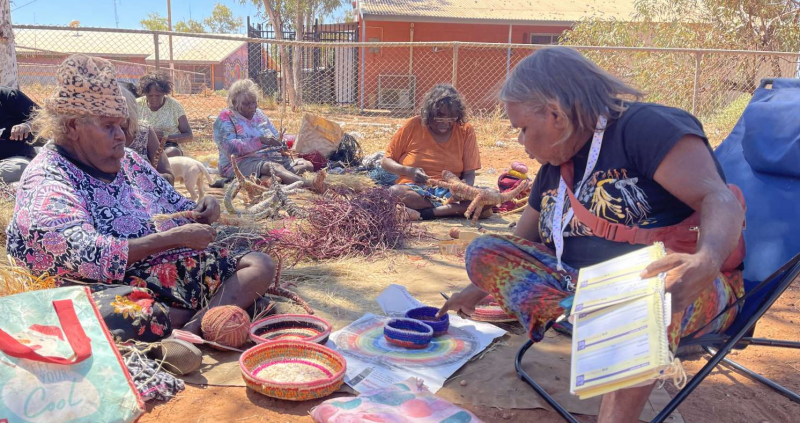New research shows art centres play important role for the aged in communities
A three year research study has found that Aboriginal art centres play a key role in delivering day-to-day care of older artists as well as creating a space of healing and respite.
Tjanpi Desert Weavers is a social enterprise supporting and elevating fibre artists from the NPY lands. Many of our artists are older women who not only form the cultural backbone of Tjanpi but also require an increasing level of care.
Art centres like Tjanpi work hard to support elderly artists and their day-to-day health needs, whilst facing challenges such as:
- Lack of formal recognition or resourcing in supporting older artists
- High demands of care from elders and community
- Poorly designed or inadequate infrastructure at art centres
The National Ageing Research Institute worked with Tjanpi Desert Weavers, Mangkaja Arts Resource Agency (Fitzroy Crossing) and Ikuntji Artists (Haasts Bluff) to conduct a research study to understand how three different art centres in remote locations support their older artists. The research study was funded by a Department of Health Dementia and Aged Care (DACS) Innovation grant from 2017-2021.

Key findings of the research include:
- Art centres are considered a safe space, a place of healing and respite, and a place for everyone. They reduce stigma associated with dementia and functional decline; they promote a sense of belonging.
- Art centres play an enormous role in delivering day-to-day care needs of older artists. They also facilitate social connection, spiritual and cognitive wellbeing.
- Elders are at the foundation of the art centres.
- Art Centres work hard to build and maintain relationships of trust and reciprocal models of care.
- Older artists are the senior artists, role models and ‘superstars’.
- The centres prioritise the role of Elders by creating a space where intergenerational connection, teaching and learning, and leaving a legacy are key drivers of their engagement.
- They retain a local workforce and they are in an ideal position to notice physical and cognitive changes in older artists and work with them to promote social, emotional and cognitive wellbeing.
- Elders are integral to the governance systems of art centres. Culture, Country, kin, language and storytelling are embedded into these systems and everything they do.
- The centres are immersed in their Country’s context and the history of their community.
- Many art centres are collaborating with aged care providers and have identified the potential to enhance these collaborations to better meet the needs of older artists and their families. This includes sharing infrastructure, organising joint trips to Country, sharing staffing and expertise across sites.
Tjanpi is currently advocating to government through the Royal Commission into Aged Care Quality and Safety and the recent Productivity Commission to share these keys findings. This research will also be shared through peer review journals such as the Australian Journal of Ageing.
You can learn more from the following audio visual resource.
https://www.nari.net.au/art-centres-supporting-elders-a-good-news-story

